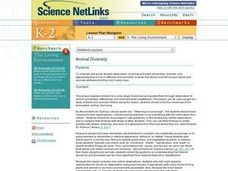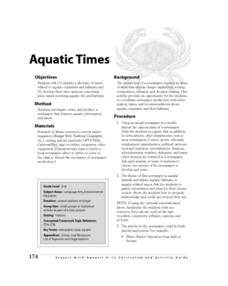Curated OER
A World in a Grain of Sand
Students go exploring Britain's beaches. In this geography lesson, students visit selected websites to learn about specific beach habitats and the history of cleaning those beaches.
Curated OER
A'ama and Pipipi Adaptations
Students explore ocean creatures. In this crustacean lesson, students determine how Black Nerite snails and Sally Light-foot crabs have adapted to their ocean habitats. Students complete diagrams and hypothesize about the necessity...
Curated OER
Animals of Louisiana
Young scholars investigate animal behaviors and habitats. In this Louisiana animals lesson, students research animals and take a trip to a wildlife refuge. Young scholars create booklets that include photographs regarding the experience....
Curated OER
Grzimek's Animal Life: Polar Bears
Students examine the physical adaptations of polar bears. In this animal adaptations lesson, students access interactive resource pages on the Internet, discovering the habitats of polar bears and their physical attributes. Students...
Curated OER
Making Nests
Second graders explore the lives of birds by researching their natural habitats. In this nest building lesson, 2nd graders investigate the craft of making a bird nest and discuss their useful qualities for the animals. Students utilize...
Curated OER
Animal Diversity
Students explore the outdoors. For this animal diversity lesson, students observe nature and identify various species of animals, both small and large. Students discuss animal habitats and how humans influence their living conditions.
Curated OER
Hula Hoop Habitats
Students explore migration. In this science activity, students play a game in which they explore bird migration. Students discuss the needs of birds and play a game in which they "migrate" in order to meet their needs.
Curated OER
What's That Habitat?
Fourth graders explore the environment by researching animal characteristics. For this habitat identification lesson, 4th graders utilize paper and crayons to illustrate their own habitats or homes and discuss what it contains that is...
Curated OER
Habitats
Students are introduced to various animals and their habitats. In groups, they must determine which animal skin matches the correct animal and identify the texture. They discuss the reason for the texture and width of the skin to end...
Curated OER
"Habitats"
Students complete a unit of lessons on animals and animal conservation. They observe a square meter of ground outside the school, set up a model environment, analyze an owl pellet, grow bread mold, and explore various websites.
Curated OER
Hunt for Habitats
Students review components of a habitat and go on a hike around a pond and woods exploring different habitats and the plants and animals that use them. They examine mammal pelts and discuss the life histories, adaptations, and positions...
Curated OER
Penguins and Their Habitats
First graders research and observe penguins in their natural habitats. They conduct Internet research, complete a penguin WebQuest, and compile information on a selected type of penguin. Using their research information they create a...
Curated OER
Habitats Pictures: Farm, Forest, Wetlands, Polar
In this science worksheet, students examine color pictures of 4 different habitats: farm, forest, wetlands and polar. There are no questions to answer.
Curated OER
Habitats Black and White Pictures: Farm, Forest, Wetlands, Polar
In this science worksheet, students examine black and white drawings of 4 habitats: farm, forest, wetlands and polar. There are no questions on the page.
NOAA
Deep-Sea Ecosystems – Entering the Twilight Zone
Imagine an ecosystem without any light or oxygen, where living things convert carbon dioxide into food. This ecosystem is thriving and might just be the largest ecosystem on our planet, yet we know very little about it. The lesson...
K12 Reader
Endangered Species
Your learners have likely heard about animals going extinct. By reading this passage, they can find out some reasons why this happens and how to protect endangered species. After reading, individuals respond to five related questions.
ARKive
Adaptations for Movement
What animals are best suited for moving around a rainforest, or a desert? Design your own animal species based on a particular habitat, focusing on the characteristics it will need for optimal movement. Great as a group lesson or...
Project WET Foundation
Discover Our Ocean
A very informative interactive presents ocean zones, estuaries, hot water vents, phytoplankton, coral reefs, sea turtles, kelp forests, and all things that thrive in the ocean.
Baylor College
A Place to Be
Home sweet home. Humans, birds, beavers, ants, we all need a place place to rest and keep us safe. In the ninth lesson of this series, the importance of shelter is discussed as the teacher reads aloud the book Tillena Lou's Day in the...
Curated OER
Where Do We Live?
Second graders investigate various types of habitats. In this habitat exploration lesson, 2nd graders view a PowerPoint presentation on habitats and explore websites to gather more information. Students choose a habitat to focus on and...
Curated OER
Stream Table
Students explore channelization, riparian habitats and soil erosion to find out about the aquatic habitats in Iowa. In this aquatic habitats lesson, students define important terms and read an article about pollution. Students complete...
Curated OER
"We're Back ... Eagles Soar!"
Students use information from Internet websites to create a map of where Bald Eagle habitats can be found after being familiarized with the map by the instructor.
Curated OER
Aquatic Times
Students identify a diversity of issues related to aquatic organisms and habitats and develop their own opinions concerning some issues involving aquatic life and habitats. They investigate, write and produce a newspaper that features...
Curated OER
Dirty Mud
Students examine geological information to study benthic marine habitats. In this watershed project, students examine wetland habitats and land uses in a watershed. They will use geological information to discuss the impact of pollution...

























